In a world where our furry companions are increasingly regarded as cherished family members, it’s only natural to want to share the joy of delicious meals with them. As we explore the diverse realms of canine cuisine, the question arises: can dogs eat teriyaki chicken?
This popular dish’s enticing aroma and savory taste might tempt even the most disciplined pet parent to share a bite with their four-legged friend.
However, before you slip a piece of teriyaki chicken under the table to your eager pup, it’s crucial to delve into the nutritional implications and potential risks associated with introducing this Asian-inspired delight into their diet.
Teriyaki Sauce Raises Concerns For Dogs
Onions and garlic are common teriyaki chicken ingredients that belong to the Allium family. They can lead to digestive issues, anemia, and other health problems in dogs.
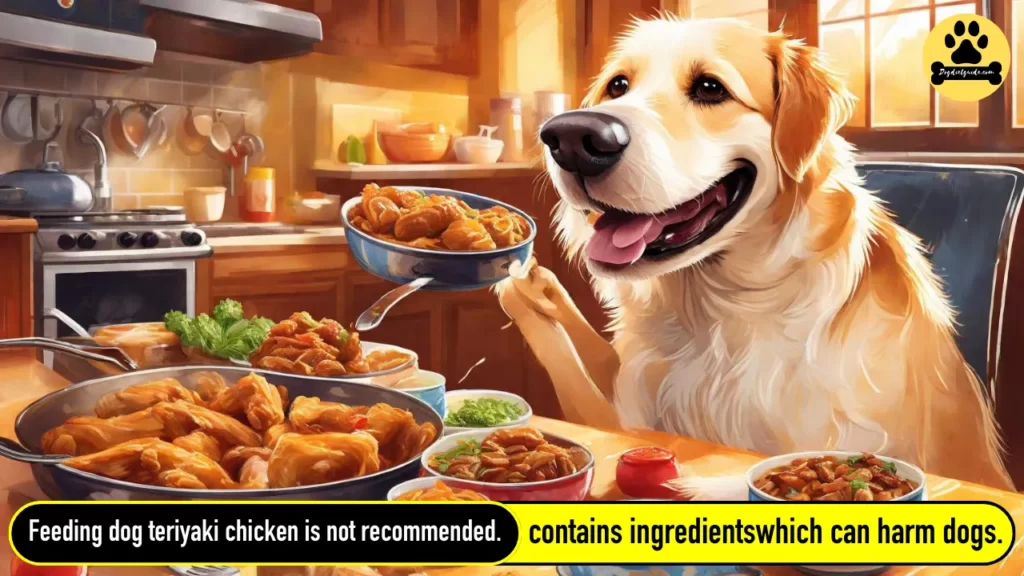
Understanding the Basics of Canine Nutrition
Before exploring the specifics of teriyaki chicken, it’s essential to establish a foundation of understanding canine nutritional needs.
Dogs thrive on a balanced diet with protein, carbohydrates, fats, vitamins, and minerals. Any additions to their diet should complement these dietary requirements.
Can Dogs Eat Teriyaki Chicken?
Feeding your dog teriyaki chicken is not recommended. Teriyaki sauce contains ingredients like garlic, onions, soy sauce, and various seasonings, which can harm dogs. Garlic and onions, in particular, belong to the Allium family and can cause toxicity in dogs, leading to symptoms such as vomiting, diarrhea, lethargy, and, in severe cases, damage to red blood cells.
Teriyaki sauce can be high in sodium and sugar, which are not suitable for a dog’s diet in excess. High levels of sodium can lead to salt poisoning, causing symptoms like excessive thirst, urination, and, in severe cases, sodium ion poisoning, which can be life-threatening.
If you want to share chicken with your furry friend, offering it in a plain, cooked form without any sauces, seasonings, or additives is essential.
Always consult your veterinarian before introducing new foods into your pup’s diet, as individual sensitivities and dietary needs can vary among canines.
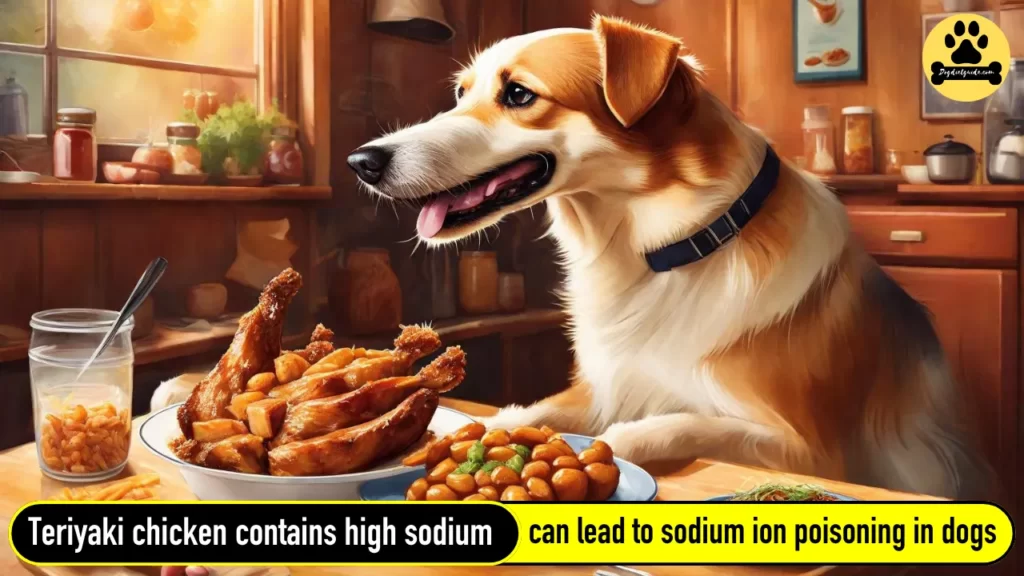
Teriyaki Chicken Health Risks For Dogs
-
Is Teriyaki Chicken safe for dogs? Teriyaki chicken often contains high sodium levels, which can lead to sodium ion poisoning in dogs.
-
Teriyaki sauce may include garlic and onions, which are toxic to dogs, causing damage to red blood cells and anemia.
-
Some teriyaki sauces have added sugars or sweeteners, like xylitol, which can be toxic and lead to hypoglycemia and liver failure in dogs.
-
Ingredients in teriyaki sauce may not agree with a dog’s digestive system, potentially causing gastrointestinal upset.
-
Teriyaki chicken for dogs with bones poses a choking hazard and can splinter, causing internal damage to a dog’s digestive tract.
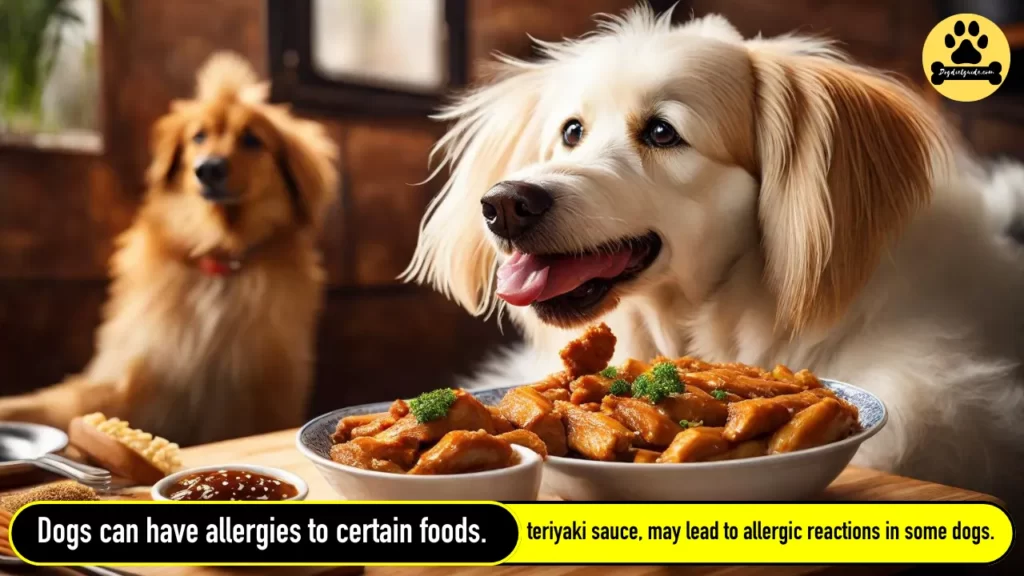
Related Post: Homemade Dog Food Recipes Vet Approved
Potential Allergic Reactions
Dogs, like humans, can have allergies to certain foods. Introducing new ingredients, especially those in teriyaki sauce, may lead to allergic reactions in some dogs.
Symptoms may include itching, swelling, or gastrointestinal distress.
Safe Alternatives for Treats
Instead of teriyaki chicken, consider offering your dog safe alternatives, such as plain cooked chicken, turkey, or lean beef.
These options provide the protein dogs need without the potential risks of certain seasonings and sauces.
Dog-friendly Chicken Recipes
1. Chicken and Sweet Potato Dog Biscuits:
Ingredients:
- 1 cup cooked chicken, shredded
- 1 cup cooked sweet potato, mashed
- 1 1/2 cups oat flour
- 1 egg
- 2 tablespoons parsley, chopped (optional)
Instructions:
-
Preheat your oven to 350°F (175°C) and line a baking sheet with parchment paper.
-
Mix the shredded chicken, mashed sweet potato, oat flour, egg, and chopped parsley in a large bowl until well combined.
-
Roll out the dough on a floured surface and use cookie cutters to cut out shapes or simply form small bite-sized balls.
-
Place the shaped biscuits on the prepared baking sheet.
-
Bake in the oven for 15-20 minutes or until the edges turn golden brown.
-
Allow the biscuits to cool completely before serving them to your pup.
2. Chicken and Rice Dog Stew:
Ingredients:
- 1 cup cooked chicken, diced
- 1/2 cup brown rice, cooked
- 1/2 cup carrots, chopped
- 1/2 cup peas
- 4 cups low-sodium chicken broth
Instructions:
-
Combine the cooked chicken, brown rice, carrots, peas, and chicken broth in a large pot.
-
Bring the mixture to a boil, then reduce the heat and let it simmer for about 15-20 minutes until the vegetables are tender.
-
Allow the stew to cool before serving it to your dog. You can serve it over your dog’s regular food or as a standalone meal.
Related Post: Can Dogs Eat Honey Bunches of Oats?
Dog Nutrition Guidelines
- Balanced Diet:
- Dogs require a balanced diet with proteins, fats, carbohydrates, vitamins, and minerals. A complete and balanced commercial puppy food or a homemade diet formulated with the guidance of a veterinarian can meet these requirements.
- Protein:
- Protein is crucial for muscle development, immune function, and overall health. High-quality animal-based protein sources like meat, fish, and eggs are essential components of a pup’s diet.
- Fats:
- Fats provide energy, support skin and coat health, and aid in absorbing fat-soluble vitamins. Sources of healthy fats include fish oil, flaxseed oil, and chicken fat.
- Carbohydrates:
- Carbohydrates supply energy from sources like grains, vegetables, and legumes. While canines are primarily carnivores, they can digest and benefit from carbohydrates in moderation.
- Vitamins and Minerals:
- Ensure your dog’s diet includes essential vitamins and minerals, such as vitamins A, D, calcium, and phosphorus. These nutrients are crucial in bone health, immune function, and overall metabolism.
- Water:
- Always provide access to fresh, clean water. Proper hydration is essential for digestion, nutrient absorption, and temperature regulation.
- Portion Control:
- Feed your dog according to their size, age, and activity level. Avoid overfeeding, as obesity can lead to various health issues. Consult your veterinarian to determine the appropriate portion size for your pooch.
- Avoid Toxic Foods:
- Some human foods can be toxic to canines, including chocolate, onions, garlic, grapes, raisins, alcohol, and artificial sweeteners. Familiarize yourself with a list of foods harmful to dogs and keep them out of reach.
- Regular Exercise:
- Alongside a nutritious diet, regular exercise is essential for maintaining a healthy weight and promoting overall well-being.
- Regular Vet Check-ups:
- Schedule regular veterinary check-ups to monitor your dog’s health, receive guidance on nutrition, and address any specific dietary needs or concerns.
Final Thoughts: Can Dogs Eat Teriyaki Chicken?
In conclusion, Teriyaki chicken with its sauce poses potential risks. Prioritize your dog’s well-being by avoiding seasonings like garlic and onions and steering clear of high-sodium sauces.
Option for simple, unseasoned proteins to ensure a safe and enjoyable treat for your furry companion.

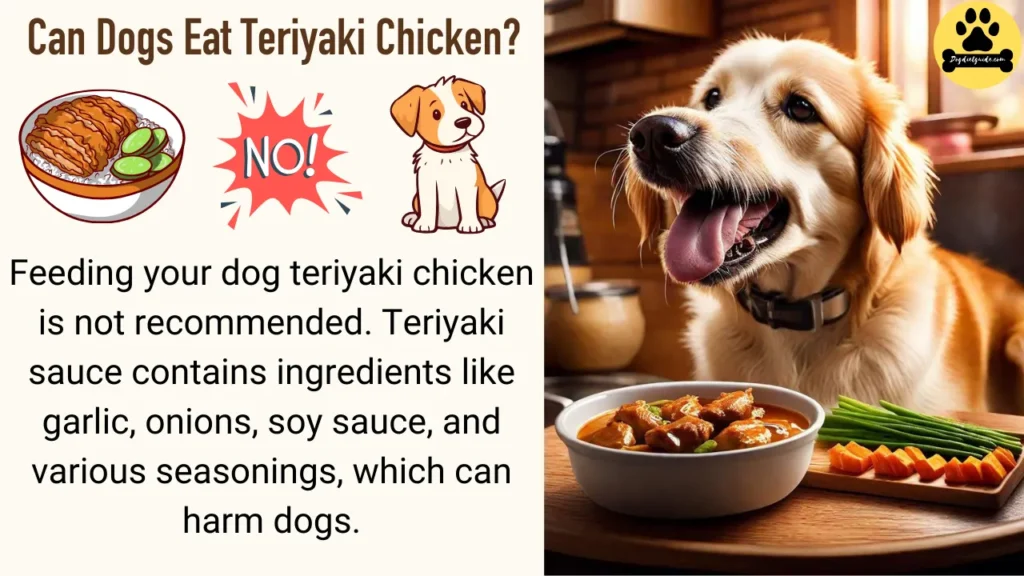

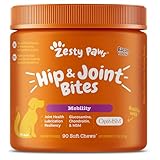






![Can Dogs Eat Blood? 7 Side Effects [Expert Opinion]](https://petskor.com/wp-content/uploads/2022/04/Webp.net-resizeimage-12.jpg)
